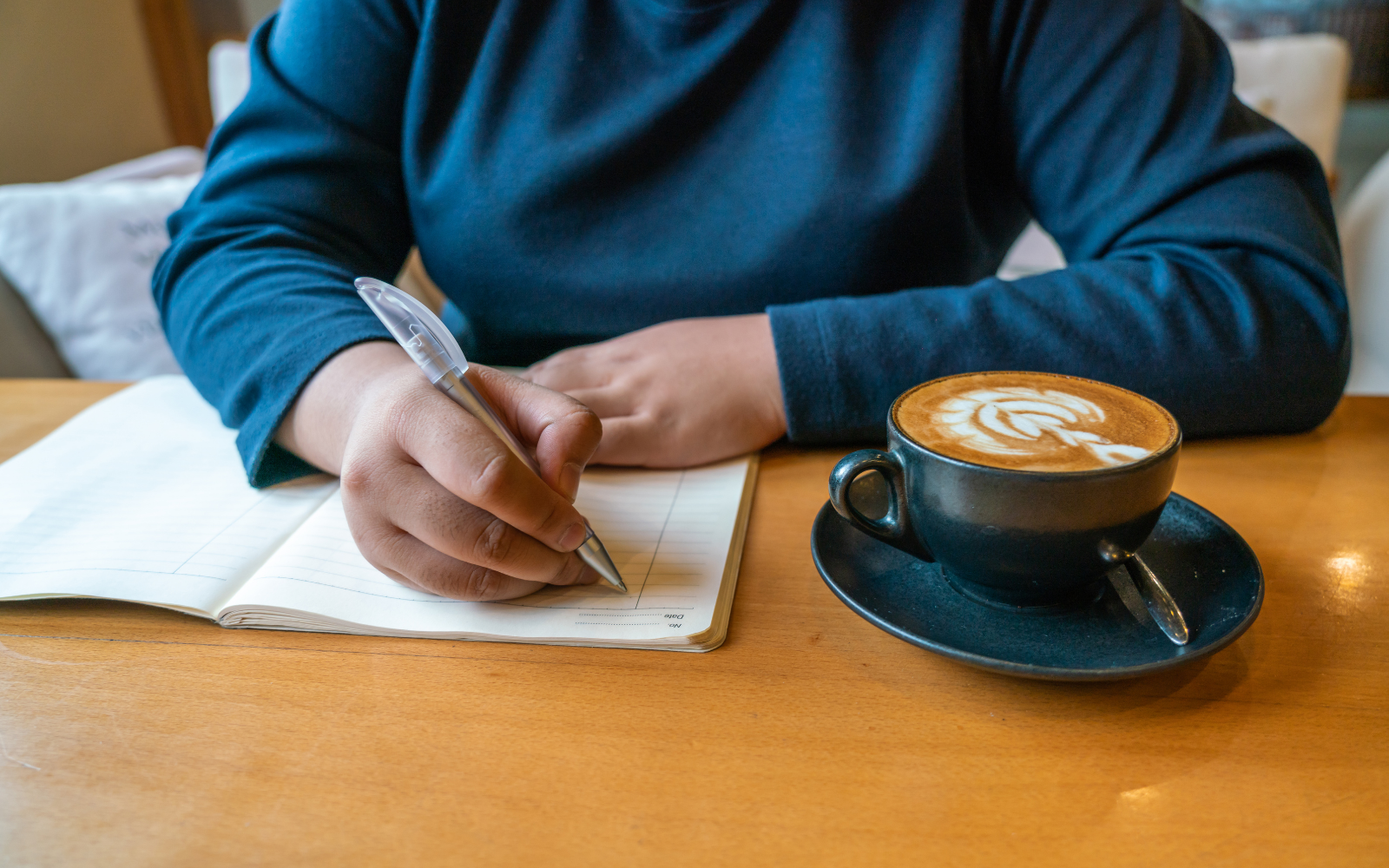Sun, Sand, & Self-Esteem: Navigating Body Image in the Summer
June 21, 2024

Guest post written by Chiara Toscano, 4th-year dietetics student, University of Ottawa
With summer quickly approaching, the weather warming up and beach days ahead, body image is a topic on a lot of people’s minds. While the warmer months are usually a time to relax and unwind, they can unearth a lot of negative feelings about our bodies for many of us. Starting in early spring, we get bombarded with a slew of ads (1) (Ex: Get shredded for summer! Start working on your beach body now!) encouraging us to start dieting, exercising, detoxing, etc. to get our ‘beach body’ ready. And when we inevitably fail to meet whatever body standard is the flavour of the day, we feel like we’ve failed. We might even end up feeling too preoccupied about what we look like to actually enjoy the season and all the joy it can bring.
So, how can we navigate the treacherous waters of body image during the summer months? Is there a way we can take the summer back, and nurture a healthier body image? In this blog post, we’ll dive deep into body image. What it is, what affects it, and why it can be so difficult to maintain a healthy body image during the summer months. We’ll also share some practical, evidence-based tips on how to cultivate a better body image for yourself.
So, what is body image exactly?
Body image is our subjective perception of our bodies; regardless of how our bodies actually look. But it’s not only about appearance - body image is complicated. It’s made up of our thoughts, feelings, judgments and behaviours related to our bodies. It is a learned concept that is deeply affected by the world around us; from our families, friends, peers, the media, to societal and cultural norms (2). Ok, you might be thinking - so how does body image actually show up in my day-to-day life? For some, it might take the form of ‘scripts’ or self-talk. For example, negative body image might sound like ‘I hate how I look in this dress’ or ‘Everyone else looks so confident in their swimsuits - why can’t I?’. It could also manifest as a physical sensation - feeling uncomfortable or anxious in your clothes, feeling like all eyes are on you, or being too afraid to wear certain things. A negative body image can also show up in our behaviours and result in avoiding activities because we’re afraid of how we will be perceived.
While we might think that a positive body image means loving every part of our bodies, this is rarely the case for most people. A healthier body image could sound like ‘I’m grateful my body allows me to experience this beautiful day’ or ‘I feel confident and comfortable in my clothes’. For some, a healthier body image can simply mean less time spent thinking about your body at all - freeing up space for more interesting thoughts. It doesn’t mean that you need to feel amazing about your body at all times (body image fluctuates for all of us), it simply means that even if we have a negative thought about our bodies, it doesn’t change how we fundamentally feel about ourselves, nor does it impact our behaviours.
The perils of bad body image
Is having a negative body image bad for you? Well, studies have shown that holding a negative self-image can affect our mood and has been associated with depression (3), anxiety (4), and a greater risk of developing disordered eating (5). This was found to be more prevalent among those living in larger bodies (6) and 2SLGBTQIA+ folks (7), likely due to a variety of factors contributing to the stigmatization of their bodies (the entertainment industry, formal media, politics, etc.)(8). Certain stages of life can be particularly difficult in terms of body image - adolescence (9), pregnancy and the postpartum period (10), as well as menopause (11), can all represent challenging times for our self-image. In contrast, research shows that a positive body image can decrease the risk of depression, anxiety and disordered eating (12).
Why is having a healthy body image so difficult during the summer?
There is a lack of research on why exactly the warmer months can cause body image distress. Current theories include increased pressure during the summer to conform to society’s ideals of a ‘beach body’ (13). This could be seen through advertisements, which start ramping up in early spring to promote weight loss diets or exercise programs. It may also come from social media in the form of sponsored posts or our favourite influencers. Social media itself also makes it easier than ever to compare our bodies to others - which might be leaving our body image worse off. With the temperature rising, we also tend to be more aware of our bodies, because summer clothing trends (shorts, tank tops, skirts, swimsuits…) and warm weather generally mean showing more skin. For many, this can make it really difficult to maintain a positive body image.
How can we navigate body image challenges during the warmer months?
Cultivate self-acceptance
This can be easier said than done for so many of us. Self-acceptance starts with accepting your here-and-now body. When negative thoughts arise in your mind about your body, try looking at them through a self-compassionate lens (14). For example, after trying on an old pair of shorts, you might think ‘These shorts fit me last year, but this year, they’re too small. I need to shrink to fit them’. Observe your first reaction without judgment. Then, try thinking of a more self-compassionate way of looking at the situation. This could sound like ‘My body has changed since last year and that’s ok. My clothes should fit me and not the other way around. I’ll buy a new pair because my body deserves to feel comfortable’. There are so many reasons our bodies might change throughout our lives. And there is no need to judge these changes - just accept them as is. If you find it difficult to practice self-compassion, ask yourself, what would I tell a good friend in this situation? What would I tell my daughter? We deserve the same compassion that we give to others.
Practice mindfulness
Daily mindfulness practices have been shown to have a positive impact on our mental health, decreasing symptoms of anxiety and depression (15). Mindfulness can be applied to all areas of our lives - including food. In fact, mindful or intuitive eating has been shown to have beneficial impacts on our digestion, and other indicators of health (16). So, try adding a bit of mindfulness to your day. You could try incorporating a daily meditation practice (for which there are tons of great apps out there to help guide you). Breathing exercises, or simply taking a few minutes every day to check in with how you're feeling and be more aware and present in the moment (like right when you wake up, while you’re waiting in line somewhere, while walking, etc.) are other great ways of adding a bit of mindfulness to your day. These will help you get more in tune with your body, and help you focus on how it feels and what it can do, instead of just how it looks.
Engage in gratitude
It might sound silly, but gratitude can have a profound effect on not just our mental health, but also our physical health (17). Some easy ways to incorporate a gratitude practice into your daily life include gratitude journaling, expressing gratitude to others, or simply making an effort to notice what you are grateful for in your daily life. It’s also a great tool to help you improve your body image. When engaging in your gratitude practice, try thinking of how you are grateful for your body. For example, ‘I’m so grateful my body gives me the strength to go biking/hiking/walking.’ or ‘I’m grateful my body allows me to experience nature’. You can also try expressing gratitude for nature, or things that you are looking forward to during the summer months - ‘I’m grateful for the sunny weather’ or ‘I’m grateful for the beautiful summer flowers’.
Surround yourself with positive influences
Being surrounded by positive influences can help support you on your journey towards a healthier body image. Try fostering connections in your life that empower you. A good sign is if you feel uplifted, inspired and confident in yourself after being around someone. In the virtual world, try following creators who promote body acceptance and make you feel good about yourself and your body.
Limit your triggers
It can be hard to maintain a positive body image when we are exposed to constant reminders that our bodies don’t conform to society’s ideals through social media, advertisements, and even certain people in our lives. Try unfollowing or muting content creators, influencers or others on social media that might be affecting your self-esteem. Do you find yourself doom-scrolling through your favourite influencer’s account, wishing you looked like them, and feeling awful afterwards? That’s probably a sign you’d be better off without them popping up on your feed. You can also limit ads and even report ads promoting dieting and weight loss so they are less likely to pop up in your feed.
Triggers can also come in the form of certain relationships in our lives. Do you have that one friend who constantly makes comments about their bodies, and how dissatisfied they are with them? Or maybe they make comments about your appearance. This can be extremely triggering, and a sign that you may need to set some boundaries with them. Next time they make a comment about their body, or yours, try gently but firmly redirecting the conversation. It may even be worth it to have an honest conversation with them and discuss why those comments are unhelpful and triggering.
How our clothes fit our bodies can also be a major trigger. Try wearing clothes that fit you well, so that you’re not constantly pinching, tugging and readjusting them. Ill-fitting clothes can trigger thoughts about your body - wasting precious brain space for other, more interesting things. If you’re holding onto clothes that don’t fit or stop yourself from buying clothes that do, ask yourself why that is. Remember, all bodies deserve comfort and the ability to move around the world easily. If you need tips on how to do this, you should check out Finding Your Fit.
Get in touch with nature
Studies have shown that spending time in nature not only increases feelings of connectedness to nature but also increases our appreciation of our bodies (18). Try to plan activities or outings in nature that you genuinely enjoy, and focus on how your body feels, and not how it looks during these activities. Gentle walks in your local park, hikes in the woods, swimming, etc. can do wonders for not only your mental and physical well-being but also your body image.
The Bottom Line on Body Image
Body image is a complicated concept made up of our thoughts, feelings, behaviours, and judgments about our bodies. It is deeply affected by the world around us, and having a negative body image can be bad for both our mental and physical health. The summertime can be an especially difficult time of the year for so many of us to maintain a healthy body image. Some strategies to help you with this during the summer months include cultivating self-acceptance, practicing mindfulness, engaging in gratitude, surrounding yourself with positive influences, limiting your triggers, and getting in touch with nature.
We hope that armed with these tips, you’ll be able to nurture a better body image through the warmer months and get back to what matters - like enjoying the season.
Want to learn more?
Are you interested in learning more about weight science, body respect and how we can support a healthy body image through the clothes we wear? Jennifer has released a brand-new online program with the help of designer Rebecca Rowe called Finding Your Fit. This program will help you develop body confidence and great style, at any size.
References
- Griffiths, S., Austen, E., Krug, I., & Blake, K. (2021). Beach body ready? Shredding for summer? A first look at “seasonal body image.” Body Image, 37, 269–281. https://doi.org/10.1016/j.bodyim.2021.03.004
- Hosseini, S. A., & Padhy, R. K. (2023). Body Image Distortion (Archived). StatPearls Publishing. https://pubmed.ncbi.nlm.nih.gov/31536191/
- Silva, D., Ferriani, L., & Viana, M. C. (2019). Depression, anthropometric parameters, and body image in adults: a systematic review. Revista Da Associação Médica Brasileira, 65(5), 731–738. https://doi.org/10.1590/1806-9282.65.5.731
- Ramseyer Winter, V., Gillen, M. M., Cahill, L., Jones, A., & Ward, M. (2017). Body appreciation, anxiety, and depression among a racially diverse sample of women. Journal of Health Psychology, 24(11), 1517–1525. https://doi.org/10.1177/1359105317728575
- Walker D.C., White E.K., Srinivasan V.J. A meta-analysis of the relationships between body checking, body image avoidance, body image dissatisfaction, mood, and disordered eating. Int J Eat Disord. 2018 Aug;51(8):745-770. doi: 10.1002/eat.22867. Epub 2018 Apr 16. PMID: 29659039.
- Weinberger, N.-A., Kersting, A., Riedel-Heller, S. G., & Luck-Sikorski, C. (2016). Body Dissatisfaction in Individuals with Obesity Compared to Normal-Weight Individuals: A Systematic Review and Meta-Analysis. Obesity Facts, 9(6), 424–441. https://doi.org/10.1159/000454837
- McClain, Z., & Peebles, R. (2016). Body Image and Eating Disorders Among Lesbian, Gay, Bisexual, and Transgender Youth. Pediatric Clinics of North America, 63(6), 1079–1090. https://doi.org/10.1016/j.pcl.2016.07.008
- Westbury S., Oyebode O., van Rens T., Barber T.M. Obesity Stigma: Causes, Consequences, and Potential Solutions. Curr Obes Rep. 2023 Mar;12(1):10-23. doi: 10.1007/s13679-023-00495-3. Epub 2023 Feb 14. PMID: 36781624; PMCID: PMC9985585.
- Senín-Calderón, C., Rodríguez-Testal, J. F., Perona-Garcelán, S., & Perpiñá, C. (2017). Body image and adolescence: A behavioral impairment model. Psychiatry Research, 248, 121–126. https://doi.org/10.1016/j.psychres.2016.12.003
- Hodgkinson, E. L., Smith, D. M., & Wittkowski, A. (2014). Women’s experiences of their pregnancy and postpartum body image: a systematic review and meta-synthesis. BMC Pregnancy and Childbirth, 14(1). https://doi.org/10.1186/1471-2393-14-330
- Vincent, C., Bodnaruc, A. M., Prud’homme, D., Olson, V., & Giroux, I. (2023). Associations between menopause and body image: A systematic review. Women’s Health (London, England), 19, 17455057231209536. https://doi.org/10.1177/17455057231209536
- Baceviciene, M., & Jankauskiene, R. (2020). Associations between Body Appreciation and Disordered Eating in a Large Sample of Adolescents. Nutrients, 12(3), 752. https://doi.org/10.3390/nu12030752
- Teng, Y., Huang, S.-W., Li, Z., Xie, Q.-M., Zhang, M., Lou, Q.-Y., Wang, F., & Zou, Y.-F. (2020). Seasonal variation and trends in the Internet searches for losing weight: An infodemiological study. Obesity Research & Clinical Practice, 14(3), 225–233. https://doi.org/10.1016/j.orcp.2020.04.001
- Braun, T. D., Park, C. L., & Gorin, A. (2016). Self-compassion, body image, and disordered eating: A review of the literature. Body Image, 17, 117–131. https://doi.org/10.1016/j.bodyim.2016.03.003
- Hofmann, S. G., & Gómez, A. F. (2017). Mindfulness-Based Interventions for Anxiety and Depression. Psychiatric Clinics of North America, 40(4), 739–749. https://doi.org/10.1016/j.psc.2017.08.008
- Van Dyke, N., & Drinkwater, E. J. (2013). Review Article Relationships between intuitive eating and health indicators: literature review. Public Health Nutrition, 17(8), 1757–1766. https://doi.org/10.1017/s1368980013002139
- Schache, K., Consedine, N., Hofman, P., & Serlachius, A. (2018). Gratitude - more than just a platitude? The science behind gratitude and health. British Journal of Health Psychology, 24(1), 1–9. https://doi.org/10.1111/bjhp.12348
- Baceviciene, M., Jankauskiene, R., & Swami, V. (2021). Nature Exposure and Positive Body Image: A Cross–Sectional Study Examining the Mediating Roles of Physical Activity, Autonomous Motivation, Connectedness to Nature, and Perceived Restorativeness. International Journal of Environmental Research and Public Health, 18(22), 12246. https://doi.org/10.3390/ijerph182212246
Leave a comment
Comments will be approved before showing up.
Also in Nutrition News

Starbucks and Tim Hortons are selling high-protein lattes: Do you need them?
September 17, 2025
Starbucks and Tim Hortons are jumping on the high-protein trend, but do you need a high-protein coffee?

Bone Health in Women After 40: How to Keep Your Bones Strong for Life
April 11, 2025
Wondering how to keep your bones strong as you age? This blog breaks down how menopause, nutrition, and even weight loss medications like Ozempic impact your bone health—and what you can do to protect it.

Don't Make These Four Mistakes Planning your New Year's Resolutions
December 16, 2024
+Recent Articles
-
Starbucks and Tim Hortons are selling high-protein lattes: Do you need them?
September 17, 2025
-
Bone Health in Women After 40: How to Keep Your Bones Strong for Life
April 11, 2025
-
Don't Make These Four Mistakes Planning your New Year's Resolutions
December 16, 2024
-
The #1 Eating Mistake You May Be Making Over the Holidays
December 11, 2024
-
A Holistic Approach: Managing Endometriosis Symptoms through Nutrition and Lifestyle
November 27, 2024
-
Nourish to Flourish: Nutrition and Lifestyle Strategies for Managing PCOS
September 30, 2024
-
Thriving Through Perimenopause: Simple Nutrition and Lifestyle Changes for Symptom Relief
July 22, 2024
-
Beat Period Symptoms: Nutrition and Lifestyles Hacks for a Better Period
July 08, 2024
-
Sun, Sand, & Self-Esteem: Navigating Body Image in the Summer
June 21, 2024
-
Embracing Easter Treats Without Guilt: A Guide to Intuitive Eating this Easter
March 27, 2024
Sign up to get nutrition tips and tricks directly to your Inbox, as well as the latest on any promotions, webinars, or services being offered by Nutrition IQ.
© 2025 Nutrition IQ.


